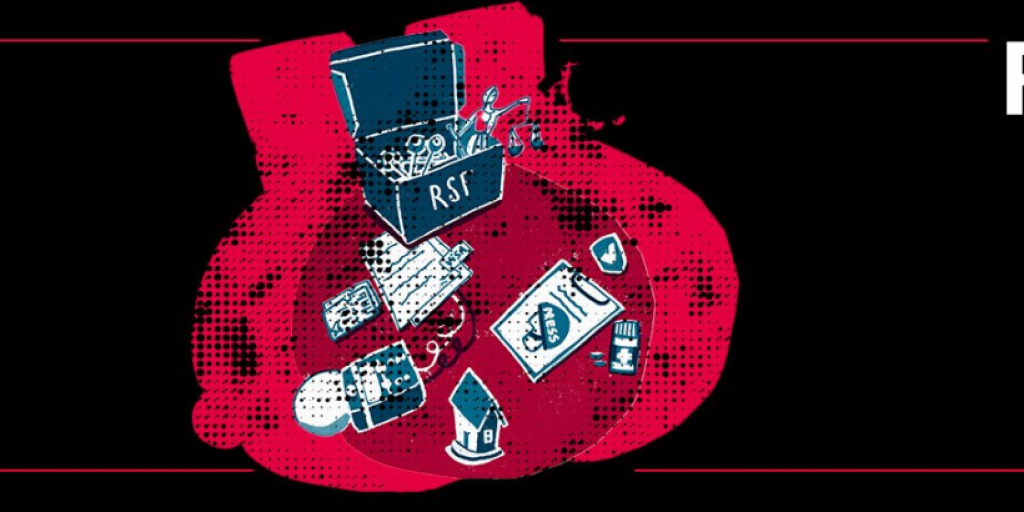NGO’s support shows risks are growing for journalists forced into exile
Our 2024 Assistance Report has been released, and it reveals not only how the growing phenomenon of forced exile particularly affects journalists, but also how supporting journalists in exile is crucial to protecting the right to information today.
Risks for information professionals covering conflict zones have increased worldwide. Seventy percent of the NGO’s emergency funds were allocated to relocating persecuted journalists from all corners of the globe, with more than 700 receiving support from RSF in 2024.
Linked to the surge in threats against journalists in conflict zones – as highlighted in RSF’s 2024 Round-up on abuses against journalists – the RSF Assistance Office allocated the majority of its financial aid to both temporary and permanent relocations.
These grants enabled journalists from Asia to the Americas, from the Middle East to Africa, and Eastern Europe, to seek safety in the face of death threats, imprisonment, and physical retaliation for their work
The Assistance Office also distributed grants to journalists threatened in their home or transit countries, covering medical, legal, psychological and material expenses. Over 400 journalists also received administrative support.
Additionally, RSF aids media outlets facing security and financial crises. In 2024, the NGO provided emergency assistance to 42 media outlets in 16 countries, 21 of which are currently in exile.
In 2024, the RSF Assistance Office was particularly solicited by journalists from Afghanistan, as well as Russia, Iran, Myanmar and Sudan. The situations in these countries, where repression against the press is especially severe, required increased mobilisation from RSF.
- Afghanistan: Three years after the Taliban regained power, Afghanistan remains a central focus of the RSF Assistance Office, with 160 journalists supported in 2024. Over 100 of them are currently stranded in Pakistan, awaiting humanitarian visas
- Russia: In 2024, the RSF Assistance Office financially supported 72 Russian journalists in resettling outside their country and continuing their independent reporting from exile, which helps counter Kremlin propaganda
- Palestine: The most dangerous state in the world for media professionals. Over 150 journalists have been killed by the Israeli army since October 2023; at least 41 were deliberately targeted due to their work. In addition to distributing equipment in Gaza via the NGO’s local partner Arab Reporters for Investigative Journalism (ARIJ), the Assistance Office provided financial aid to 15 Gazan journalists who sought refuge in neighbouring countries, and played a key role in assisting journalists with administrative procedures, including visa applications
- Iran: The Islamic Republic of Iran remains one of the most repressive regimes for journalists. In 2024, the RSF Assistance Office supported 43 Iranian journalists in exile
- Myanmar: Considered one of the largest prisons in the world for journalists, Myanmar has seen many media professionals jailed or forced into exile. In 2024, RSF launched a support programme for Myanmar journalists displaced in Thailand, and financially supported 43 Myanmar journalists
- Sudan: Due to the war ravaging the country, Sudan is currently one of the worst places in the world for journalists. In 2024, the RSF Assistance Office supported 22 Sudanese journalists who were directly targeted because of their work
- Nicaragua: Daniel Ortega’s regime continues to intensify its repression of independent journalism – one of its primary targets. In 2024, RSF provided financial aid to Nicaraguan journalists exiled in Costa Rica to help them meet their needs, as well as several others who sought refuge in the United States
Five key RSF recommendations from the proposals in the report:
- Establish an emergency visa for journalists in danger
- Ensure access to resettlement and individual protection programmes
- Protect exiled journalists from deportation to their home countries
- Conduct transparent investigations into attacks on refugee journalists
- Update legislation to clarify that threatened journalists can be recognised as refugees
- This article was first published here




